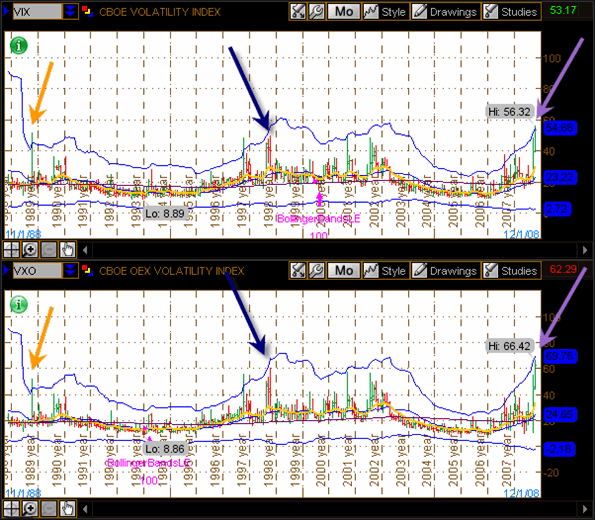| Hyperbole And The Markets |
| By Price Headley |
Published
10/6/2008
|
Currency , Futures , Options , Stocks
|
Unrated
|
|
|
|
Hyperbole And The Markets
As tough as these economic times have become, there have been opportunities to profit nicely from the recent bear market. Whether trading options, stocks or ETF's, there are many ways to place bearish plays on the market.
Last week around this same time, I mentioned that the CBOE Volatility Index (VIX) was at extreme levels and continuing to climb. This was written before the House of Representatives decided to vote down the proposed bailout package. This was politics at its worst as they chose to deny access to $700 Billion in taxpayer money and the market responded by selling off 777 points that afternoon, depleting over $1 Trillion in taxpayer wealth. Good choice ladies and gentlemen.
As we have heard all weekend long, the bill finally passed on Friday and was signed into law by President Bush. So things should be better, right? Yes and No. Although the liklihood is that this bill will help prevent a deeper and more prolonged crisis than we are currently facing, we will likely see the situation get worse before it gets better.
Although the lack of credit is often fingered as the problem, the prevailing issue right now is a lack of confidence, or simply put, fear. Nobody trusts Wall Street, and they are turning against their local bankers as well. There is no faith in the knowledge or ability of the government to improve the situation. People across the country are convinced that we are approaching Great Depression 2.
This logic is so far from the truth that it is funny. However, if you think about it, we hear these proclamations every day. When a hurricane is forming in the Gulf of Mexico, they begin to say that it is the "storm of the century." When Michael Phelps wins 8 gold medals in the summer olympics this year, people were saying that he was the greatest athlete ever to walk the face of the planet.
These points can be debated ad naseum, and they are often fun to talk about, but the bottom line is that those events are in the past, not the present; and certainly not the future. Many traders like to talk about how they were there when the tech bubble began to burst and the economy was coming to an end. That is all well and good, but they don't tell you if or how they traded those choppy waters. What we need to know is how to trade now, not focusing on the what-ifs of life.
I use market sentiment indicators to gauge the perception of market participants. To put this recent market volatility into context, we need to take a longer-term approach. To do this, we look at the VXO, the earlier version of the COBE Volatility Index. The difference between the VXO and the VIX is the index that the indicator uses as a benchmark; the VXO uses the S&P 100 (OEX) and the VIX used the S&P 500.
As you can see from the chart below, both indicies spike around the same times, but the levels of price extremes that they reach are what is different. The highest previous extreme in the VXO was 60.63 in October 1998, 10 years ago. Intra-day today we reached 66.42, easily surpassing the previous level.

In 1998, the hedge fund Long Term Capital Management went under in "The worst financial collapse since the great depression." The fund essentially collapsed due to making highly leveraged bets on risky securities that ultimately were not worth what they had originally thought. Sound familiar?
The VIX and VXO shows us two things here. One, that past market extremes are only benchmarks to be surpassed at a later date in the future, not an absolute top. And two, when a new high is established, the prevailing trend is likely to reverse in the blink of an eye. I'm preparing for this shift, and expect it to happen sooner rather than later.
Price Headley is the founder and chief analyst of BigTrends.com.
|